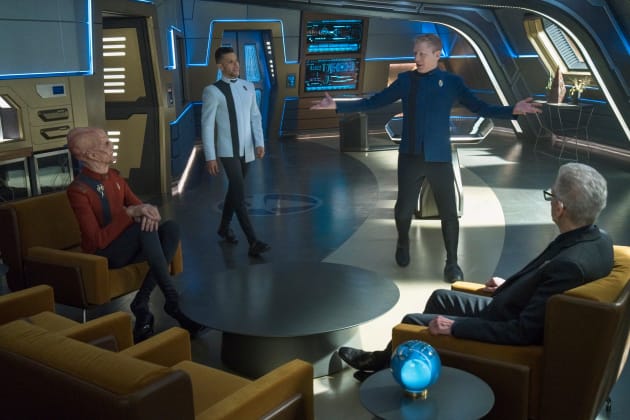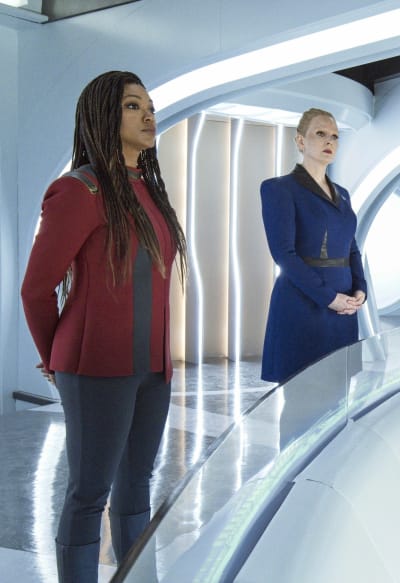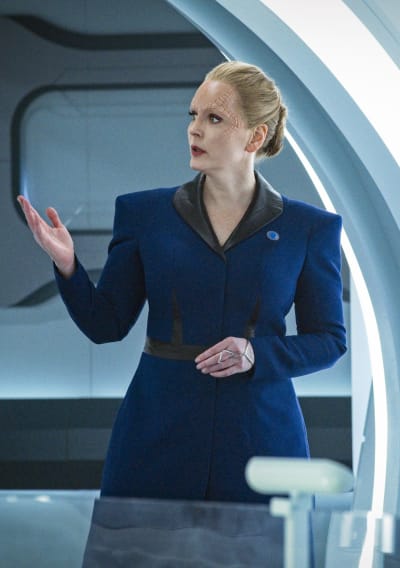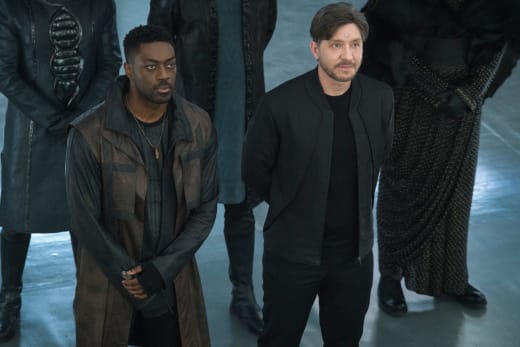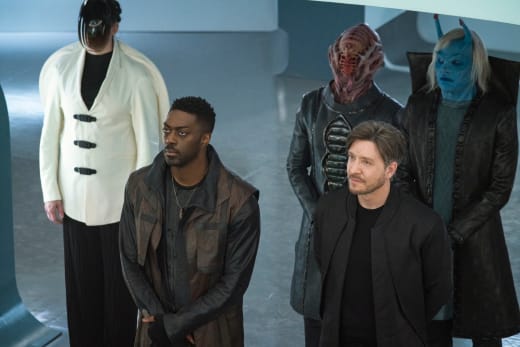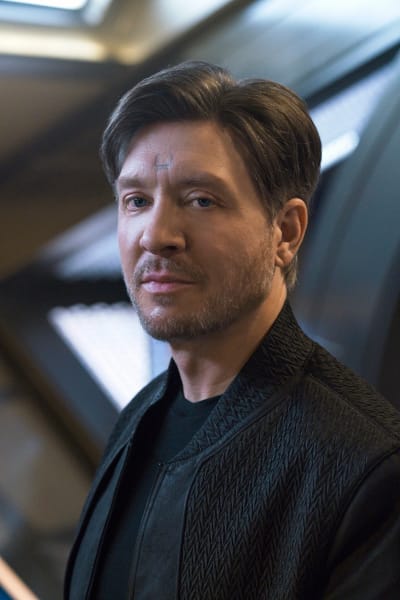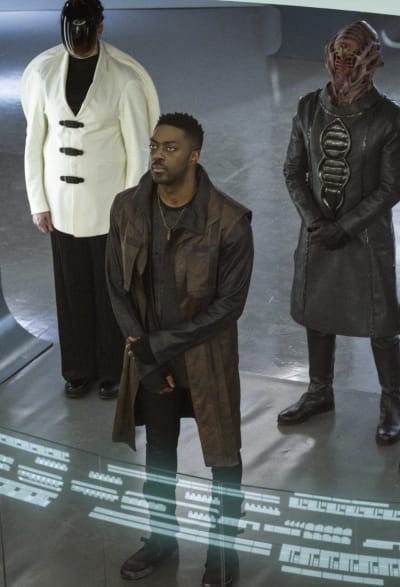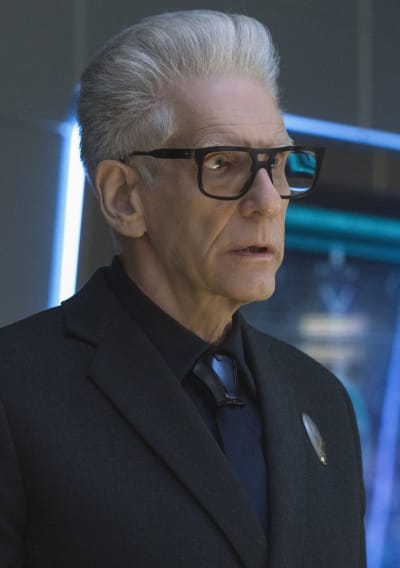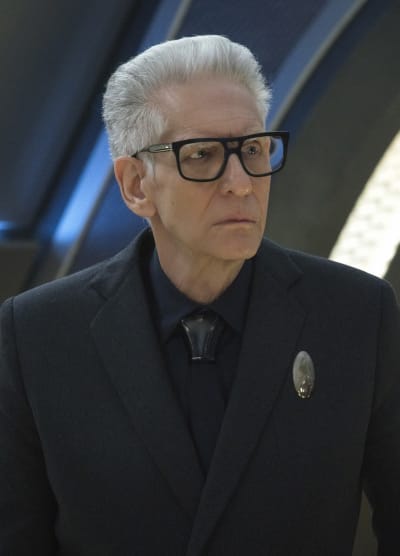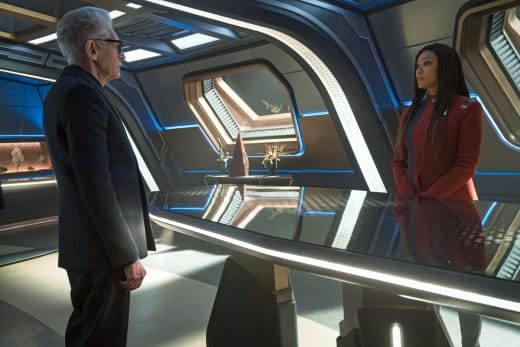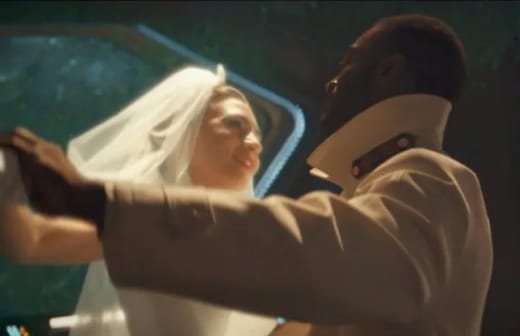Decisions, decisions. Star Trek: Discovery Season 4 Episode 7 is a crucible of decisions for the ship as well as for the Federation and its DMA-made-necessary allies.
While Dr. Kovich’s judgment on Zora’s sentience status is easily comparable to Maddox’s challenge to Data’s right to self-determination (on Star Trek: The Next Generation’s Season 2 Episode 9), Zora’s situation is more nuanced when her primary function is taken into account.
Book and Burnham part ways both ethically and physically on the question of dealing with the DMA. Although he reveals his invested interest, Tarka’s role is still suspect.
A few things about the DMA assembly sit uncomfortably with me.
As always with politics, there is posturing and puppeteering.
Rillak insists on appearing impartial but encourages Burnham to step up to speak on behalf of the peaceful approach.
I probably shouldn’t be surprised that Burnham is willing to be manipulated into being the spokesperson for the diplomatic way. It aligns with her way of thinking as a Federation officer, a Vulcan-raised scientist, and a logician.
However, she’s been cautious about Rillak from the beginning, so it is a bit off-brand that way.
Book’s visceral need to just do something is a dangerous motivator for action, and Tarka’s not above taking advantage of that.
So while he does address the assembly himself on the specifics of his plan, I firmly believe that he always intended for Book to take the lead on proposing the direct attack on the DMA.
One should never confuse ‘friendly’ with ‘friendship’.
Tarka
Tarka is a genius, but he’s self-aware enough to recognize that he is not a likable genius.
It’s possible that he had the weapon in development before he ever boarded Discovery. His primary purpose for coming on board was to find a pilot for his new spore drive who would be willing to deliver the weapon into the DMA.
The entire DMA simulation on Star Trek: Discovery Season 4 Episode 5 was to test how risk-averse Stamets was and see if he’d be a candidate for Tarka’s plan.
Needless to say, Stamets didn’t meet Tarka’s standards for willingness to blow stuff up.
On the other hand, Book was the perfect combination of simmering rage and spore drive pilot.
Tarka: So much anger. No place to put it.
Book: You don’t know me.
Tarka: No, but I know anger. It’s a wonderfully productive emotion.
I’m not sure if I buy Tarka’s story about trying to reunite with his friend from his Emerald Chain days.
For one thing, if he worked for Osyraa, coerced or not, he would have already have been acquainted with Aurelio. I feel like that should’ve been mentioned if that was the case.
For another, his plan to escape to another parallel universe is not only bonkers crazy, but it’s potentially dangerous for the Prime Universe and himself, as seen by Georgiou’s situation on Star Trek: Discovery Season 3.
I’m also suspicious of the unnamed “friend” for a number of reasons.
If the friend exists, how does he know of the specific parallel universe they plan to travel to? Is he from there originally?
Again, if the friend exists and did escape after Tarka managed to escape Osyraa, how could he possibly be waiting there if the only way to make the journey is the DMA’s power source?
And while we’re on this topic, how did Tarka escape Osyraa and the Emerald Chain?
Everything about him and Book taking off to vigilante the pants off the DMA and whoever created it rings wrong.
If I were to posit a theory, it’s that Book has Tarka’s number on some deceptive aspect of his story and plans on trapping him into disclosing the truth once they arrive at the DMA.
But it may all be wishful thinking on my part. I hate to think that Book can be so easily manipulated.
Given his core fear that Burnham would choose the Federation and Starfleet over him, her speaking out in opposition to his stance is that fear made real. That, in combination with his need to be proactive in stopping the DMA, may be enough to send him off half-cocked.
Leaving Grudge behind signals to Burnham that he doesn’t believe he’ll return.
(One day, I believe we’ll get an episode called “Grudge’s Day,” and all things will be made clear.)
Saru: Zora is undergoing changes, Doctor, but I believe she means well.
Kovich: We always mean well to ourselves, Captain. Problem is what that means for others.
The question of Zora’s sentience and whether it violates Federation laws about artificial intelligence is a classic Trek quandary.
Given his experience with Control, Stamets’s perspective is an understandable one. In many ways, he represents the viewpoints of much of the fanbase that has been freaked out by Zora’s evolution.
(Again, I urge everyone to go back and watch Star Trek: Short Treks Season 1 Episode 2, “Calypso,” and calm the heck down.)
Kovich’s, ironically, enters the situation with more audience respect and affection than Maddox did on ST: TNG’s “The Measure of a Man” since we’ve seen him in action with Georgiou, Tilly, and Culber already.
Maddox was eventually redeemed (and then sacrificed) by his dream of recreating Noonian Soong’s accomplishment of creating sentient synthetic life.
Kovich has no such personal ambition. He’s here to do a job, and his brutally honest approach is almost synth-like in its tactlessness.
Two elements of Zora’s analysis are key to her salvation.
First is her spontaneously actualized dream module. The fact that she has dreams, aspirations, fears, and other emotional connections is a significant development.
Yes, I hear you haters out there; Data developed these attributes eventually too.
However, he consciously programmed them into his matrix. Or, in the case of emotion, Lore added a mod unit. And that was a toxic form of emotion that had to be fixed later. Again, consciously.
Zora’s developments have been as “organic” as a machine’s growth could be. Unconscious but progressive evolution. Much like the relationships aboard the ship.
The second singular aspect of Zora’s existence is the primary function she has chosen for herself: To protect the crew of Discovery.
Even Data didn’t have an altruistic directive overriding all other functions in his programming. His goal was to become as human as a synthetic life-form could become. It was a personal and self-contained goal.
Zora’s primary function supersedes her own existence. She provides the kill switch in case she ever becomes a threat to the crew.
Because. They. Are. More. Important. To. Her. Than. She. Is. To. Herself.
Is your mind blown yet?
The discourse out on the interwebs has been comparing Zora and Data, and I understand that. Some continue to draw parallels between her and Control, and all y’all need to get real.
For me, Zora is far more reminiscent of Gomtuu from Star Trek: The Next Generation Season 3 Episode 20, “Tin Man.”
Gomtuu was a sentient creature who served as a ship for a telepathic species. Their only function was to protect their crew, and when that crew died from radiation that Gomtuu survived, they sought to end their life.
Zora’s chosen a life of symbiotic benefit. The well-being of her crew is her mission. By becoming a member of Starfleet, she not only has a place and a purpose, but she also has a family.
One day, we know she will end up alone (for a time). I sincerely hope it’s not for a few seasons yet, but, again, that might just be me and my wishful thinking.
Which decision made more of an impact on you?
How will the DMA crisis resolve itself? Will Book and Burnham reunite?
Will you be rewatching fanatically during the midseason hiatus?
Star Trek: Discovery resumes with new episodes on Paramount+ on February 10th, 2022. Beam down to our comments with your thoughts and predictions for what comes next!
Diana Keng is a staff writer for TV Fanatic. Follow her on Twitter.
